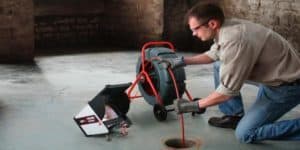The drainage and sewer system is one of the most critical sections in a home plumbing system. The drainage and sewer system includes all plumbing components and installations that are involved in waste water drainage and waste disposal, such as sinks, bathtubs, showers, toilets, dishwashers, laundry machines etc. Like the names imply, the drainage and sewer system can be split into the actual drainage section and the sewer system. The drainage system includes all the drainage pipes and the aforementioned waste disposal installations. The sewer system is mainly composed of the septic tank plus all the drainage pipes that run underground to link the tank to your house. Your home drainage and sewer system should always be clean and unclogged in order to ensure the proper disposal of all the waste produced in your home. Read on to learn how to properly clean and unclog you drains and how to maintain your home sewer system in excellent condition.
Handling Clogs
One of the most common plumbing problems in any drainage and sewer system is clogging. Clogging occurs when a section of the sewer system is blocked preventing the flow of waste from your home to the septic tank. Clogging usually occurs in drainage pipes where something gets stuck inside the pipes thereby preventing waste flow from one point to another. Clogging can be caused by various agents including the accumulation of grease and other insolvent impurities inside the drainage pipes. Breakages in drain pipes and pipe flow compression issues by vegetation cover can also result in clogged drains. You can prevent clogs by observing a strict waste disposal routine where all insolvent stuff is not dumped into your drainage and sewer system. And in case the clogs occur, you can try a few DIY hacks to clear your drains. One of the simplest ways of unclogging your sewer system is by using a hand plunger to suck debris from any drainage link, such as a toilet, shower or bathtub drain, or sink. If this does not work, you might have a grease accumulation problem on your hands — use hot water to flush the drainage system. You can also use various commercial detergents to unclog your drain. And if the problem persists, call a professional plumber for assistance.
Regular Inspection
Your plumbing system should always be subjected to regular inspection runs to avoid any nasty surprises. Whether it’s your drainage and sewer system or your inflow piping system, you should always conduct regular inspections to ensure that everything is in good working condition. Routine inspection runs go hand in hand with routine maintenance tasks. After identifying any areas that require some upgrades or renovations, a professional plumbing inspector will recommend a feasible solution to correct the problem. Your drainage pipes or septic tank might need some upgrading but you might not realize this until you hire a professional plumber to inspect your home plumbing system.
Timely Repairs
You should never hesitate to call a professional plumber if you have a faulty drainage and sewer system. In case of any drainage and/or sewer problems, hire a licensed plumber who is capable of handling DC plumbing renovations and repairs in a timely manner. When it comes to the sewer system, you can’t spare any expenses.




